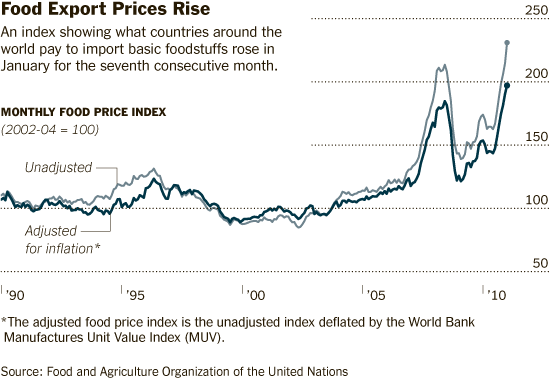When you don’t have enough to eat, nothing else matters. Therefore food security is the most fundamental raison d’être of any socioeconomic system. So this chart is a problem:

Starting in 2007, food prices entered unprecedented territory. In 2008, food insecurity led to widespread food riots in undeveloped nations. Prices plunged along with the global economy in 2009. The current price spike, as severe as the first, has been a catalyst of the current social unrest in the Middle East.
There are multiple factors at play: climate change and associated extreme weather events, the rising price of oil, financial speculation in commodities, trade liberalization (leading to dependence on international markets), conversion of food into biofuel, high levels of meat consumption in industrialized nations such as the U.S., and rising levels of meat consumption in industrializing nations such as China and India.
Despite the overwhelming complexity and importance of this crisis the task of formulating a policy response has been seized by economists, who seem to only recognize engineering responses:
In the long run, economists say the only real solution will be to increase the supply of affordable food. They are urging governments in poorer countries to invest in roads and irrigation to support local agriculture and to reduce agricultural waste. More controversial proposals involve increasing the use of genetically modified seeds, controlling population and opening up more markets to global trade.
Unfortunately, it is the blindness to the cultural and socioeconomic drivers mentioned above that leads to adaptive responses myopically focused on increasing the production of food. These will necessarily fail in the long run, as increasing production within our current framework actually exacerbates many of these drivers.
By shaping policy solely upon the disciplinary framework of economics, policymakers bind themselves ever more tightly to the situation in which they already find themselves, which is running faster and faster merely to stand still.


I think I would add “Even since the classic civilizations of Harappa & Memphis, Xi’an & Ur, Athens & Rome, we have comprehended that food security is the most fundamental raison d’être of any socioeconomic system.”
I know in one sense it is bad form to begin something with “since the dawn of time…” But then again, it has been grokked since the dawn of time and it is silly that it should have to be pointed out to anyone.